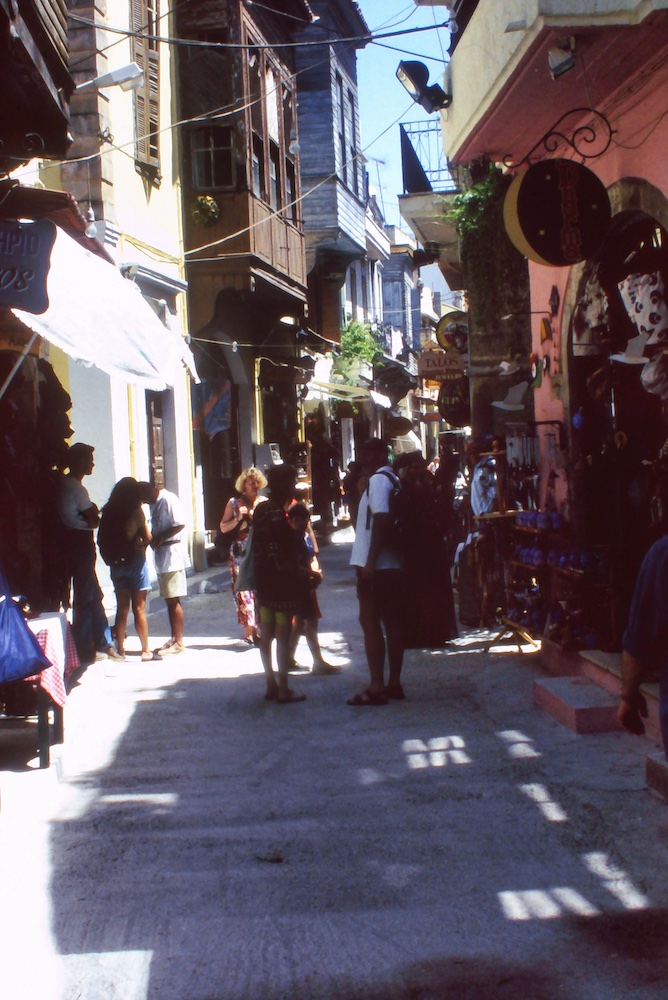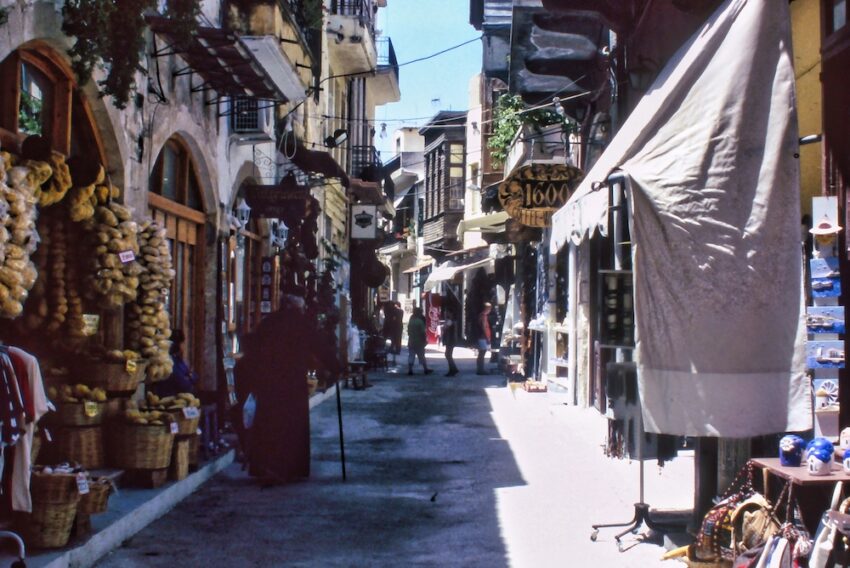5/4/98: Strolled through the lovely neighborhood streets of “old town” Rethymno. The post office. An ATM for more local currency. Read the newspaper. Called Gerry and George back in Athens to remind them we are returning in 2 days. Also had an unexpected encounter…
5/4/23: Our trip was still quite young, just 42 days on the road at this point. But I had developed a bit of a jaded or suspicious attitude toward touts and other sorts of sales-people. We had been taken advantage of a few times already. Of course, we also had had some wonderful experiences with warm and welcoming local people who made us feel like old friends.
In contrast to that, I also had a deep sense of responsibility to be a respectful guest in the countries we were visiting. We had already encountered tourists who not only seemed uninterested in local culture, but who flouted local customs and etiquette. And we recognized the accompanying disgust with which local people distrusted such travelers. So, I was a bundle of emotional and psychological contradictions, suspicious and fearful of each new encounter on the one hand, but curious and hopeful on the other.
What an interesting dance takes place when traveling. Host and visitor both tempted to baser instincts, but ideally rising above and treating one another with respect and kindness. This reminded me of the Apostle Paul’s letter to Titus, who was a pastor on the island of Crete.
Paul had visited the island himself, and famously quoted the poet philosopher Epimenides of Crete in his epistle. In warning Titus, he wrote: “One of the Cretans, a prophet of their own, said, ‘Cretans are always liars, evil beasts, lazy gluttons.’ This testimony is true…” (Titus 1:12-13) While it is a paradox for a Cretan philosopher to say: “We Cretans are all liars” (can we then trust him to be telling the truth in this statement!?), perhaps Paul’s citation simply shows that he was a bit jaded from negative travel experiences too! But Paul was also wrestling with, and instructing Titus to wrestle with, the importance of living above reproach so as to have a positive influence and missional impact on the churches and culture of Crete. He wrote:
Titus 1:5-9 “5 This is why I left you in Crete, so that you might put what remained into order, and appoint elders in every town as I directed you— 6 if anyone is above reproach, the husband of one wife, and his children are believers and not open to the charge of debauchery or insubordination. 7 For an overseer, as God’s steward, must be above reproach. He must not be arrogant or quick-tempered or a drunkard or violent or greedy for gain, 8 but hospitable, a lover of good, self-controlled, upright, holy, and disciplined. 9 He must hold firm to the trustworthy word as taught, so that he may be able to give instruction in sound doctrine and also to rebuke those who contradict it.”
And a few paragraphs later:
Titus 2:7-8 “7 Show yourself in all respects to be a model of good works, and in your teaching show integrity, dignity, 8 and sound speech that cannot be condemned, so that an opponent may be put to shame, having nothing evil to say about us.”
These were the things still swirling through my mind, because I was still haunted by our experience 2 days earlier. We had rented a car for a driving tour of west Crete and stopped for a meal at a charming little restaurant in some small town along the way. But I only Turkish lira in my wallet and no Greek drachmas. The proprietor was gracious and simply let us off the hook for the bill, but I was left with embarrassment, fearing he thought we were scammers dodging a check. While we strolled through the streets of Rethymno on May 4, we were shocked to run into that same restaurant owner, in town to pick up supplies. We stopped him right there on the street, reminded him of the outstanding debt, and promptly paid our bill. Boy, was he surprised! It was such a relief to see thankfulness and trust in his eyes instead of doubt. And for me, I learned another important life lesson: dealing in the currency of integrity builds bridges and helps to knock down the walls of suspicion and fear.



